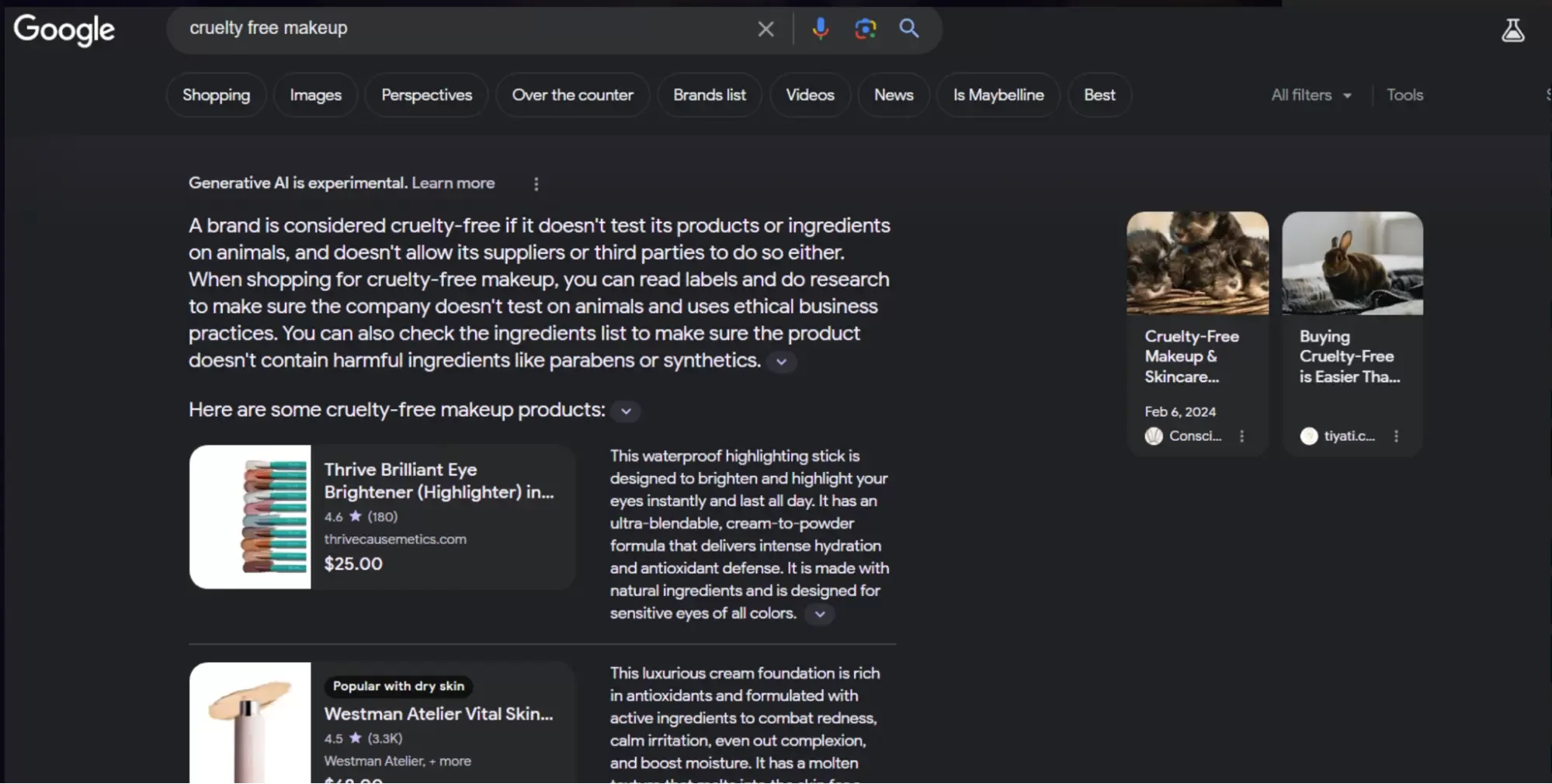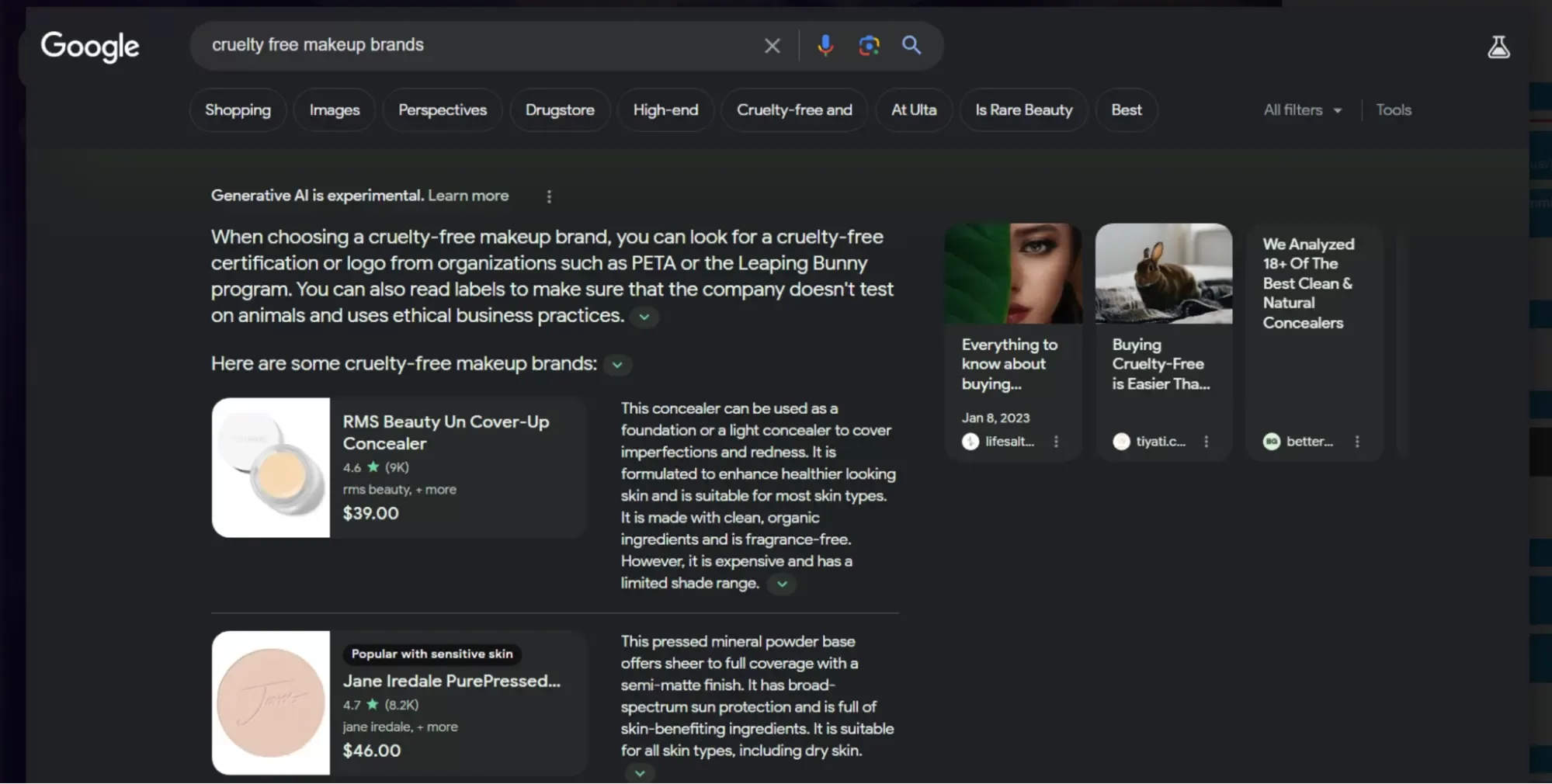What is SGE?
SGE, or Search Generative Experience, is one of the ways Google is using generative AI to power search. Rather than entering a search term and clicking a link in the traditional search engine model, SGE uses AI to provide users with a quick and clear overview of their prompt right from the point of search.
While the idea of SGE taking over traditional search may seem alarming, it’s probably not time for SEOs to hit the panic button. SGE is not a default and is currently only available for select users who have access to Google’s experimental testing ground for new search features, Google Labs. This should ease some concerns, as it indicates Google doesn’t feel that AI is a viable replacement for traditional search… yet.
Still, SGE and AI search seem to be looming on the horizon. With Google expanding SGE to more countries and languages and announcing circle-to-search and multi-search features on mobile devices, which both use generative AI to give users instant real-time results, it seems clear that AI search isn’t losing any momentum and should be top-of-mind when considering your SEO strategy.
Google’s Use of AI & SGE
Google has been using AI for a long time behind the scenes, with RankBrain as early as 2015 and BERT in 2018 helping the search engine to better understand the context of web content. The difference today is that Google is incorporating AI in a way that is more visible to users and more extensive than ever before.
Gemini is Google’s AI model that is both used in SGE and can be accessed by users independent of traditional Google search. Google isn’t the only player in the game incorporating AI results in search. Bing has been putting AI search at the forefront of its platform for a while now, with tools like Copilot appearing directly on the search results page and available to all users, giving them multiple options to help refine AI results.
How Does AI Generate Content?
To simplify a complex topic, AI tools like GPT or Gemini are trained on a diverse range of internet text. The AI is exposed to a vast amount of data collected from various sources on the internet, including articles, books, forums, and websites.
From there AI tools are trained to understand patterns, relationships, and context of content, allowing them to best predict how to answer a user prompt. For fun, we tried asking Bing’s Copilot to generate a visual of how generative AI works:

Should You Even Let AI Crawlers Access Your Content?
There is certainly a debate to be had about whether or not you should block AI crawlers from accessing your website’s content. The benefits of blocking are clear – blocking these crawlers protects your content from showing up in a way you can’t control and without being credited to you.
Still, if the future of search is powered by AI, you’ll want your content to show up in these types of searches and AI crawlers will need access to your content for this to happen. Additionally, any content that has already been incorporated into the language training model will still exist there, so blocking AI crawlers will only prevent them from using content that they haven’t already accessed.
With that in mind, SGE operates a little differently from other AI tools. The only way to block your site from appearing in SGE results would be to block Google’s primary crawler, Googlebot, entirely. This would also prevent your site from showing up in traditional search results, which should make the decision whether or not to block easy – just don’t do it.
Ultimately, the choice of whether or not to block other AI crawlers is up to you. Different industries will likely see varying impacts of AI search, with industries like healthcare and e-commerce seeing a bigger initial impact from tools like SGE. It might make sense to block AI crawlers from certain sections of your site but allow them to access others.
Will Organic Search Results Still Show Up in SGE & AI Searches?
Yes, at least sometimes. Google does cite and link to sources used to generate certain SGE results, though we can probably anticipate lower click-through rates and organic traffic from these types of searches. Similarly, when Google started using rich results and featured snippets, there was a rise in “zero-click searches”.
Users found what they were looking for directly on the search results page, so depending on what they are looking for they might not ever need to click further.
Depending on the type of search, however, SGE tries to anticipate what a user is ultimately looking for. In the example below, a search for “cruelty free makeup” resulted in a short write-up of what it means to be “cruelty-free”, with links to related products below and additional links to related articles and content to the side:

Interestingly, slightly changing the wording of the query produced a different generative AI write-up and different product and article links:

In another search using a different account, SGE provided different text and different article links for the same exact queries. This could be good news, as the generative AI used in SGE could cycle through various options for websites and links to display, giving different sites a chance to show up for a wide variety of queries.
However, this also means it may be harder to “own” a space here, like you might with a featured snippet and it’s important to note that not every SGE search result will produce links.
How to Optimize a Website to Show Up in SGE & Generative AI Search
The answer to optimizing a site for generative AI is the same as just about every other trend in search- content. Google favors strong, unique, trustworthy content that demonstrates E-E-A-T (experience, expertise, authoritativeness, and trustworthiness). AI tools work by using large sets of web content to identify patterns and predict what a user is looking for before generating a response.
Having reliable content that satisfies the user intent is likely to continue being the way to win in both traditional and AI search results.
Aside from content, you want to make sure your technical SEO is in order, your basics like metadata and schema markup are covered, and your site passes Core Web Vitals. Audit your existing content to make sure it’s relevant and structured in a way conducive to how AI models work.
By better understanding how AI works, you can tailor your content to have a better chance of showing up in an AI setting. Keep in mind this might not lead to traffic and weigh the pros and cons of having your website content crawled by AI tools.
The Future of SEO with Generative AI & SGE
Generative AI is being adopted more and more in various ways, including how people search the web.
While it doesn’t seem to be fully replacing traditional search and SEO yet, search engines are already using AI, tools like GPT are starting to become commonplace for many internet users, and SGE could expand to the forefront of Google search.
Understanding how it all works can help you make sure your site and content are still positioned well in an AI-powered world.
Not sure where to start? At Workshop Digital, our team of SEO experts can help! Contact us today to get started with SEO strategies that work alongside AI and drive results.

